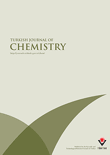
TURKISH JOURNAL OF CHEMISTRY
Scope & Guideline
Fostering Discoveries in the World of Chemistry
Introduction
Aims and Scopes
- Synthetic Chemistry:
Focuses on novel synthetic strategies and methodologies for the development of new chemical compounds, including organic, inorganic, and polymer chemistry. - Analytical Techniques:
Explores advanced analytical methods for chemical analysis, including spectroscopy, chromatography, and electrochemical techniques, aimed at improving detection and quantification in various matrices. - Materials Chemistry:
Investigates the design, synthesis, and characterization of new materials, particularly nanomaterials and polymers, with applications in energy, catalysis, and environmental science. - Biochemistry and Pharmacology:
Covers research on biochemical processes, drug design, and the evaluation of medicinal compounds, focusing on their therapeutic potential and mechanisms of action. - Environmental Chemistry:
Examines the chemical processes occurring in the environment, including pollution studies, remediation techniques, and the development of sustainable chemical practices. - Computational Chemistry:
Utilizes computational methods to model chemical systems and predict properties, aiding in the understanding of reaction mechanisms and molecular interactions.
Trending and Emerging
- Green Chemistry:
Research focusing on sustainable and environmentally friendly chemical processes is gaining momentum, emphasizing the reduction of hazardous substances and the development of biodegradable materials. - Nanotechnology and Nanomaterials:
There is an increasing number of studies on the synthesis and application of nanomaterials, particularly in catalysis, drug delivery, and environmental remediation, reflecting the growing significance of nanotechnology in chemistry. - Bioinformatics and Computational Drug Design:
The integration of computational methods in drug discovery and design is trending, with studies leveraging molecular modeling and simulations to predict the efficacy of new therapeutic agents. - Photocatalysis and Renewable Energy:
Research on photocatalytic processes for environmental cleanup and energy production is on the rise, aligning with global efforts to develop sustainable energy solutions. - Interdisciplinary Research:
There is a notable increase in interdisciplinary studies that combine chemistry with biology, physics, and materials science, reflecting the collaborative nature of modern scientific inquiry.
Declining or Waning
- Traditional Organic Synthesis:
Research focused solely on classical organic synthesis without novel methodologies or applications has decreased, as there is a growing preference for innovative approaches that integrate synthetic chemistry with other disciplines. - Basic Inorganic Chemistry:
There has been a reduction in studies that purely explore fundamental aspects of inorganic chemistry, as the journal shifts towards more applied research with direct societal or technological impacts. - Conventional Analytical Methods:
Papers centered on traditional analytical methods without significant advancements or novel applications have become less common, likely due to the rise of more sophisticated and integrated analytical techniques.
Similar Journals

Nature Reviews Chemistry
Unveiling the Future of Chemical ResearchNature Reviews Chemistry is a premier journal published by NATURE PORTFOLIO, dedicated to advancing scholarly discourse in the broad field of chemistry. With an impressive impact factor and a ranking in the 99th percentile across its categories—ranked #2 in General Chemical Engineering and #4 in General Chemistry according to Scopus—this journal is recognized for its high-quality, peer-reviewed articles that synthesize and analyze the latest advancements in chemical research. Operating under a convergence framework from 2017 to 2024, Nature Reviews Chemistry aims to provide comprehensive insights and critical examinations of contemporary chemical practices, thereby reinforcing its status as a vital resource for researchers, professionals, and students alike. Although it is not an open-access journal, the breadth and authority of its content make it essential for those looking to stay at the forefront of chemical sciences.
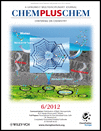
ChemPlusChem
Connecting Researchers to Transform the Landscape of ChemistryChemPlusChem is a premier journal published by WILEY-V C H VERLAG GMBH, dedicated to the vibrant field of chemistry. With an ISSN of 2192-6506 and an impressive Q1 ranking in Scopus's 2023 category for miscellaneous chemistry, this journal serves as a significant platform for the dissemination of high-quality research and innovative findings. Since its inception in 2012, ChemPlusChem has fostered interdisciplinary collaborations, encapsulating a wide array of topics within chemistry that facilitate scientific advancement and education. The journal features a robust open access system, enabling extensive visibility for authors while providing easy-to-access resources for researchers, professionals, and students globally. Located in Weinheim, Germany, ChemPlusChem reflects international standards and ambitions, striving to enrich the global scientific community through rigorous research and engaging scientific discourse.
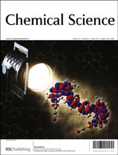
Chemical Science
Empowering Researchers Through Open AccessChemical Science, published by the esteemed Royal Society of Chemistry, is a leading open-access journal that has been a pivotal platform for disseminating high-quality research in the field of chemistry since its inception in 2010. With an impressive Impact Factor and ranked in the Q1 category of Chemistry (miscellaneous) and holding a distinguished rank of #34 out of 408 in General Chemistry according to Scopus, it is widely recognized for its rigorous peer-review process and innovative contributions to the discipline. The journal embraces a global readership by providing an open-access model since 2015, thereby making vital scientific advancements accessible to researchers, professionals, and students alike. Covering various branches of chemistry, Chemical Science aims to publish original research articles, reviews, and communications that advance our understanding and application of chemical sciences. With its commitment to excellence and its continued relevance in a rapidly evolving field, Chemical Science is an indispensable resource for anyone engaged in chemistry research and education.

REVUE ROUMAINE DE CHIMIE
Catalyzing Innovation in the Realm of ChemistryREVUE ROUMAINE DE CHIMIE is a distinguished academic journal in the field of chemistry, published by EDITURA ACAD ROMANE in Romania. With an ISSN of 0035-3930, this journal has been a valuable platform for disseminating original research and insights in the diverse realm of chemistry since its inception. The journal currently operates under a competitive tier, categorized in Q4 for miscellaneous chemistry fields, as reflected in its Scopus ranking of #348 out of 408, placing it within the 14th percentile. Aiming to foster scientific discourse and innovation, the REVUE ROUMAINE DE CHIMIE provides a repository of knowledge that is crucial for researchers, professionals, and students eager to advance their understanding and contribute to the global chemistry community. By bridging local and international research initiatives, this journal plays an essential role in enhancing the visibility of Romanian scientific contributions on the world stage.
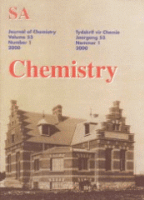
SOUTH AFRICAN JOURNAL OF CHEMISTRY-SUID-AFRIKAANSE TYDSKRIF VIR CHEMIE
Unleashing Potential: Chemistry Without BarriersSouth African Journal of Chemistry (Suid-Afrikaanse Tydskrif vir Chemie), published by Bureau Scientific Publications, is a pivotal open-access journal that has been disseminating groundbreaking research in the field of chemistry since its inception in 1996. With an ISSN of 0379-4350 and an E-ISSN of 1996-840X, this journal serves as a vital platform for researchers and professionals seeking to share their work and engage with the global chemistry community. Recognized for its significant contributions, the journal holds a Q3 quartile ranking in the miscellaneous chemistry category as of 2023 and ranks #216 out of 408 in General Chemistry according to Scopus. The South African Journal of Chemistry is dedicated to advancing knowledge in the discipline by publishing a wide array of articles, reviews, and studies that address pertinent chemical research and applications. With open access options available since 2000, it fosters a collaborative environment, ensuring that research is accessible to all, thereby enhancing the visibility and impact of chemists' work across South Africa and beyond.

CHINESE JOURNAL OF CHEMISTRY
Exploring innovative solutions in the chemical sciences.The CHINESE JOURNAL OF CHEMISTRY, published by WILEY-V C H VERLAG GMBH, is a distinguished peer-reviewed journal that has been contributing to the field of chemistry since its inception in 1990. With an impressive Q1 ranking in the Chemistry (miscellaneous) category and a Scopus rank of 67 out of 408, this journal is recognized for its rigorous scholarly standards and significant impact within the academic community. Renowned for publishing high-quality research, reviews, and insightful commentaries, the journal serves as a vital resource for researchers, professionals, and students keen on advancing their understanding of general chemistry and its applications. Although it does not offer open access, the journal remains an essential outlet for innovative chemistry research, attracting contributions from a global network of specialists. With its broad scope covering various aspects of chemistry and a commitment to fostering scientific dialogue, the CHINESE JOURNAL OF CHEMISTRY is poised to continue its role as a central pillar in the ever-evolving landscape of chemical sciences.
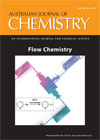
AUSTRALIAN JOURNAL OF CHEMISTRY
Elevating the standards of chemistry research worldwide.The Australian Journal of Chemistry, with an ISSN of 0004-9425 and an E-ISSN of 1445-0038, is a distinguished publication from CSIRO PUBLISHING, dedicated to advancing the field of chemistry since its inception in 1948. Based in Australia, this journal serves as a platform for original research articles, reviews, and innovative studies that encompass a wide spectrum of chemical disciplines, aiming to foster communication and collaboration among researchers globally. Despite its Q3 ranking in the Chemistry (Miscellaneous) category and standing at rank #236 in Scopus’ general chemistry classification, it remains an essential resource for professionals and students seeking to stay informed about emerging trends and discoveries in chemistry. The journal does not offer open access, emphasizing the premium quality of peer-reviewed content that adheres to rigorous academic standards. By bridging theory and practice, the Australian Journal of Chemistry continues to play a crucial role in shaping the future of chemical sciences.
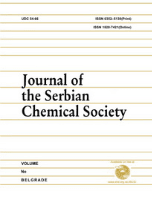
JOURNAL OF THE SERBIAN CHEMICAL SOCIETY
Fostering Innovation in Chemical Research Since 1930JOURNAL OF THE SERBIAN CHEMICAL SOCIETY, an esteemed publication in the field of chemistry, is published by the SERBIAN CHEMICAL SOCIETY and has been an essential platform for the dissemination of research since 1930. With an ISSN of 0352-5139, this Open Access journal is dedicated to fostering communication and collaboration among chemists worldwide, making its contents readily accessible to researchers, professionals, and students alike. Based in Serbia, the journal features a wide range of topics within the domain of general chemistry, as reflected in its Scopus rankings, which place it in the 34th percentile among its peers. The journal's engagement with the global scholarly community is further underscored by its consistent publication history since 1985, with coverage extending through to 2024. As the journal continues to evolve, it remains committed to promoting high-quality research and advancing the field of chemistry.
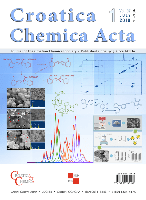
CROATICA CHEMICA ACTA
Advancing Chemistry Through Open Access InsightsCROATICA CHEMICA ACTA, published by the Croatian Chemical Society, is a prominent open-access journal dedicated to fostering the dissemination of research in the diverse field of chemistry. With an ISSN of 0011-1643 and an E-ISSN of 1334-417X, this journal has been a vital platform for scientists since its inception, providing unrestricted access to groundbreaking findings since 1990. Located in Zagreb, Croatia, the journal covers a wide array of topics within general chemistry and strives to contribute significantly to the body of knowledge in the discipline. Although currently positioned in the Q4 quartile of the Scopus ranking within Chemistry (miscellaneous), and ranking #366 out of 408 journals, CROATICA CHEMICA ACTA plays a crucial role in promoting emerging research and innovative methodologies. As a valuable resource for researchers, professionals, and students, the journal encourages the exchange of scientific insights, with an eye towards fostering collaboration and advancing chemical sciences.

RUSSIAN CHEMICAL BULLETIN
Innovative Research. Timeless Impact.RUSSIAN CHEMICAL BULLETIN, published by SPRINGER, serves as a pivotal resource in the field of general chemistry, covering a wide array of topics that impact both theoretical and applied chemistry. With an ISSN of 1066-5285 and a presence since 1993, this journal provides a platform for disseminating significant research findings, practical applications, and novel methodologies within the broader chemistry community. While it currently holds a Q3 ranking in the Chemistry (miscellaneous) category and occupies the 230th position out of 408 in the Scopus rankings, its reputation continues to grow, fostering collaboration and innovation among researchers and professionals alike. Although the journal does not offer an open-access model, it is committed to making findings accessible within the academic community, ensuring that valuable insights can inform future research. With an anticipated convergence of studies extending to 2024, the RUSSIAN CHEMICAL BULLETIN remains an essential reference for those dedicated to advancing chemical science.